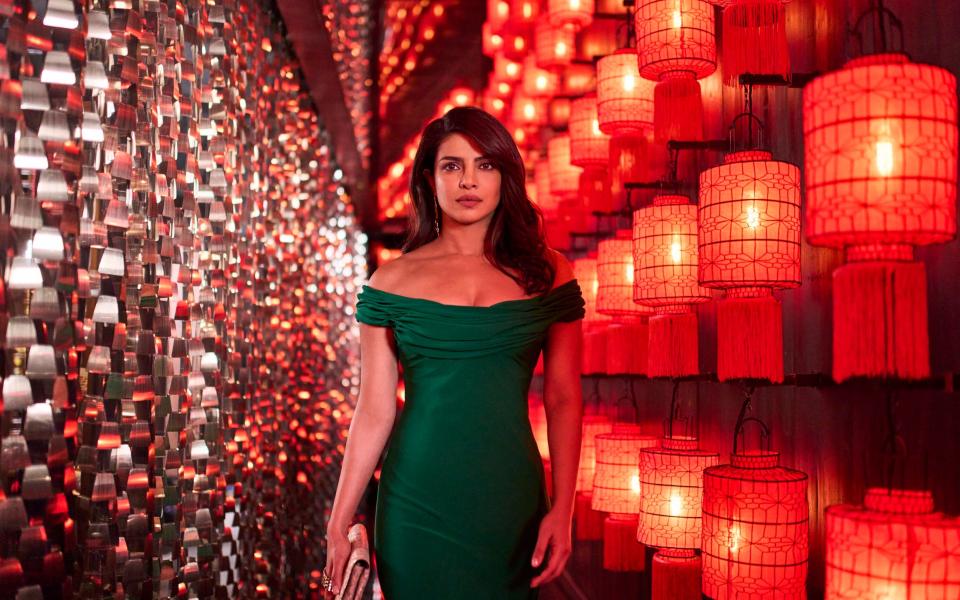Blame Bezos, Jeff Bezos. Fresh from Donald Trump’s inauguration, the Amazon boss has wrested control of the James Bond franchise away from its custodians, Barbara Broccoli and Michael G Wilson. Henceforth, Bond belongs to Bezos. Consider 007 fans very much shaken and stirred.
Within 24 hours of the deal’s announcement, Bezos was on social media asking, “Who’d you pick as the next Bond?”. Suggestions included Tom Cruise, Elon Musk and Top Gear’s James May. Whoever inherits the tuxedo from Daniel Craig, it seems inevitable Amazon will do what it does best: package Bond into just another mass-produced franchise in the sorry recent tradition of Marvel and Star Wars. Buckle up for the 007 versions of The Mandalorian and She-Hulk.
The internet is already in a tizzy over what a Bond expanded universe might look like. Who’s up for a high school drama in which Bond, Blofeld, Miss Moneypenny and the future Q and M all happen to be in the same class? A Blofeld origin story where it is revealed that we’d got him wrong all along: that he (assuming Blofeld is still a “he”) is a victim of the patriarchy, as represented by toxic Bond?
Anything is possible. But we need to look only to Amazon’s most recent attempt at an international espionage franchise for a depressing sneak preview of what might lie ahead. We refer to Prime Video’s $300 million (and counting) 2023 folly Citadel – a towering inferno of iffy action courtesy of Marvel’s Russo Brothers, which is far worse than even Bond’s sorriest moments (okay, maybe not as bad as Pierce Brosnan’s invisible Jag in Die Another Day but definitely in the same time zone).
The big idea with Citadel was that it would do for the global espionage thriller what the Marvel Cinematic Universe has for superheroes. It was centred on an underground spy network called Citadel, which “has helped shape every major event for good in the last 100 years”.
ADVERTISEMENT
Every major event for good? Obviously, Citadel was taking a breather during the First and Second World Wars, the Great Depression, Vietnam, the break up of Yugoslavia and Gary Barlow’s solo career – yet is otherwise regarded as having done a sterling job guaranteeing world peace. However, it has a mortal foe in the form of a rival agency, Manticore – representing “the world’s wealthiest families” and bent on global dominion.
Watching Citadel, it’s tempting to conclude that it is an artefact from an alternate universe where James Bond is a bit rubbish. With Bodyguard’s Richard Madden playing the lead spy and Lesley Manville as the Blofeld-esque mega-villain (undercover as a UK Ambassador), it has a thick veneer of Britishness. It’s chock-full of globe-trotting, with the fun pinging between US, London, Paris and Italy (though the bulk of the filming was in Slovenia and Birmingham).
Plus, there are oodles of gadgets, including futuristic memory-wiping devices that would have Q puce with envy. And just like James “Make Mine a Land Rover” Bond, it’s stuffed with product placement: you can even press “pause” to purchase products flogged by the series (if you want to buy the suit worn by Madden, just go ahead and call up your Amazon account).
Then there’s the cast. Madden and his spy partner Priyanka Chopra Jonas fulfil the glam quotient. But international raconteur Stanley Tucci looks wildly uncomfortable as the “M” figure pulling the strings and Manville, a character actress more at home in kitchen sink drama, has refused to watch Citadel because she loathes violence. A second season greenlit by Amazon will meanwhile include Matt Berry and Jack Reynor – assuming it goes ahead now that Prime Video has the keys to the Bond juggernaut.

To be fair, on paper at least Citadel didn’t sound terrible (not that it sounded particularly compelling either). Amazon certainly felt it had a sure-fire smash on its hands. It didn’t even take the time to establish that there was an audience for yet another spy series to go alongside Bond, Jason Bourne, Mission: Impossible, Archer, Slow Horses, The Night Manager, etc. Instead, it greenlit Citadel and multiple spin-offs for “local markets”– including India, Italy and Mexico.
ADVERTISEMENT
But then, who at Prime Video was going to say no to the boss? The overarching concept of Citadel originated with Jennifer Salke, head of Amazon Studios and the person to thank for such gems as the atrocious Tolkien spin-off The Rings Of Power (a series that desperately needs casting into a fiery pit). Convinced she was on to a winner, she reached out to the Russos, then a hot property on the backs of their Avengers movies.
“She called us one day and said, ‘Hey, I have this idea that I want for a show.’ And she goes, ‘I don’t know what it’s about – but this would be the concept,’” said Anthony Russo.
The Russos fleshed out her idea of globe-trotting spies by conceiving of Citadel and its mortal foe, Manticore. “This agency ends up coming in conflict with a new rival agency that has been developed by the world’s elite to sort of protect their self-interests,” said Anthony. “So it’s a global struggle between these two competing points of view about what humanity should be.”

Unfortunately the Russos were too busy to take a hands-on role in Citadel (among other undertakings, they were making ditchwater dull $200 million action movie The Gray Man for Netflix). So they passed it to writers Josh Appelbaum and André Nemec (who had worked with Hollywood’s own mystery box man, JJ Abrams, on Alias), with Game of Thrones veteran Brian Kirk directing five of the seven episodes of the first season.
ADVERTISEMENT
Which is where the trouble started. Amazon is said to have had “reservations” about early footage presented by Appelbaum and Nemec. One source of contention was an ambitious – and expensive – “ski and hand-gliding sequence” with which the pilot was to open.
With Applebaum and Nemec in a stand-off with Amazon, the Russos returned and agreed to kill the set-piece (which was to have been followed by a five-year time jump). They were just getting started: Appelbaum departed, and Kirk and producer Sarah Bradshaw followed soon afterwards. Roll on multiple reshoots, which pushed the budget to a mind-boggling $300 million (twice what it costs the Broccolis to make Die Another Day).

Whatever about Manticore’s plan to sew chaos on the screen, in the real world, confusion appears to have reigned unchecked. “What should have happened was Joe [Russo] turning to Josh [Appelbaum] and saying, “Let’s get together and fix this instead of going solo’,” one source told the Hollywood Reporter. “That’s not what partners are supposed to do.”
Having taken over, the Russos decided to rebuild Citadel from the ground up. They brought in cinematographer Thomas Sigel for additional footage and David Weil – writer of the Al Pacino Nazi drama Hunters – to rework the scripts. Meanwhile, costs continued to balloon.
ADVERTISEMENT
But where that money went was unclear when Citadel – clocking in at a mere six episodes – finally reached the screen (season two is due in 2025). It looked shoddy, and after an admittedly memorable opening shoot-out featuring Madden and Chopra on a train, there wasn’t enough action. The plot in which Madden’s Mason Kane loses his memory was meanwhile stonkingly derivative – to the point where his on-screen wife jokingly refers to him as “Jason Bourne”.

Then there was the “twist” – it turns out Manticore had manipulated Madden’s character into betraying Citadel to protect his family. As Game of Thrones’ Robb Stark, Madden was out front of the notorious Red Wedding bombshell episode. Here, by contrast, was a damp squib rendered in 50 shades of beige.
Cheap-looking, unoriginal and bland, Citadel impressed no one. “A pricey Bond audition tape,” said the Telegraph – focusing on Madden’s performance. “A choppy, generic blockbuster-by-numbers with a nine-figure budget you’d never detect from the chintzy CGI.” agreed Variety.
The public was even less forgiving. “A very mediocre show that feels written by AI… Predictable, messy, you do not care about the characters in the slightest,” wrote one viewer. “Flat, uninspired and just plain boring.”
Undeterred, Amazon ploughed on with its global spin-offs – though without the Russos, who have gone back to Marvel, where they are working on the inevitable new Avengers movies. The first, Citadel: Diana, was set in the Italian Alps and produced for Prime by Rome-headquartered ITV subsidiary Cattleya. It debuted last April to deafening indifference.
That was also the response to Citadel: Honey Bunny – an Indian prequel which followed the early romance of the parents of Chopra’s character. It topped the Amazon viewing charts in India but, much like George Lazenby in On Her Majesty’s Secret Service, otherwise came and went without a trace.
Vanishing without a trace is not a fate a 21st-century James Bond is likely to suffer. But the failure of Citadel is nonetheless a depressing sneak preview of what may lie ahead for Ian Fleming’s super-spook. Cheesy and hamstrung by too much executive meddling, Citadel took a sure-fire formula – spies hop around the globe shooting people – and missed the target by a mile.
Apply the same treatment to Bond, and cinema’s favourite spy might well suffer a fate worse than the one Goldfinger had in mind when he strapped Sean Connery to that table and whipped out his laser. A cack-handed Prime Video might well leave Bond morally wounded, and anyone who suffered through Citadel will fear the worst.
EMEA Tribune is not involved in this news article, it is taken from our partners and or from the News Agencies. Copyright and Credit go to the News Agencies, email news@emeatribune.com Follow our WhatsApp verified Channel





